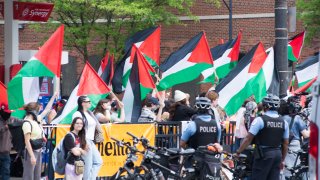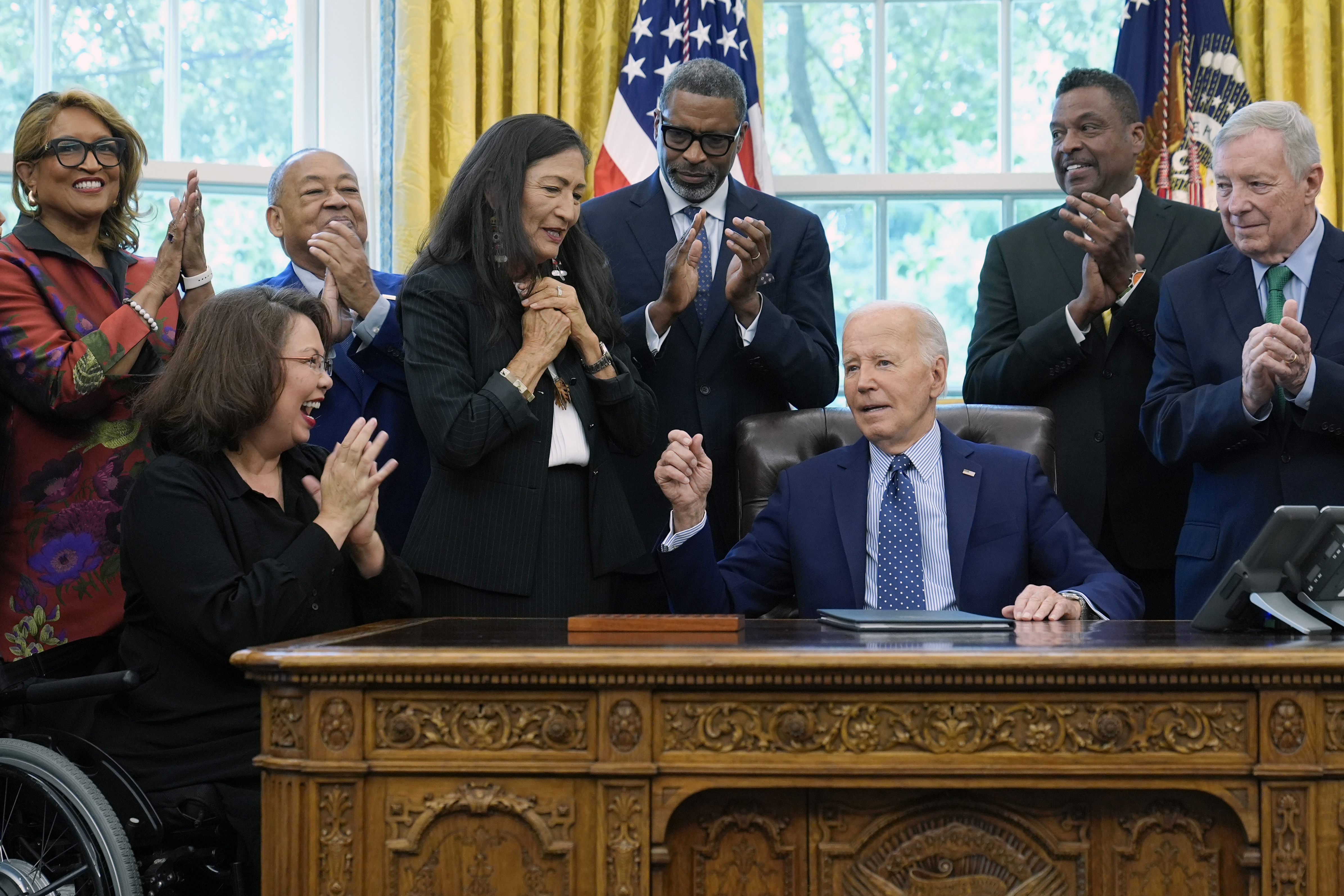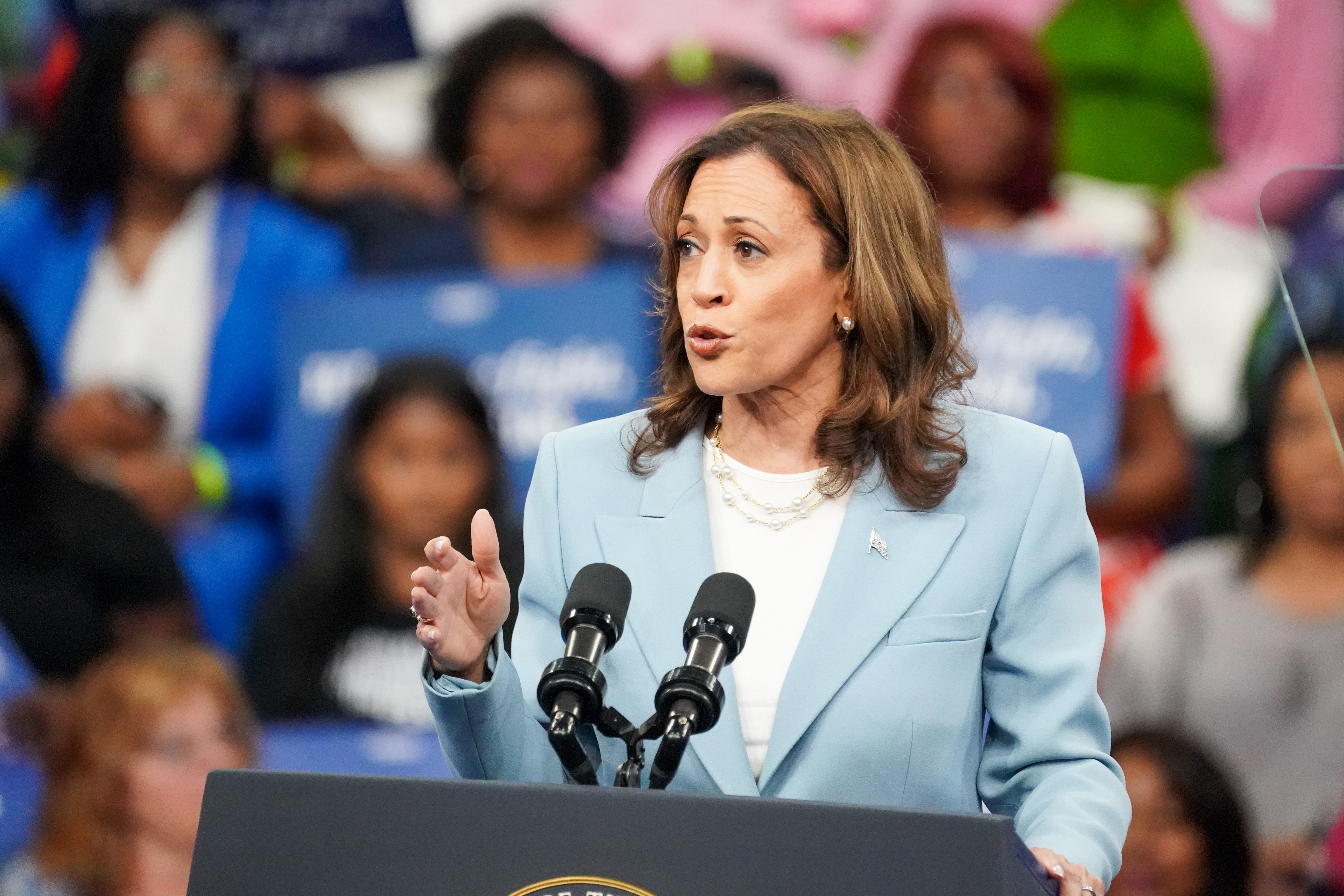
More than 20,000 protesters are expected to cram into a 1.4 mile-long court-approved protest route near Democratic National Convention in Chicago next week, creating a potential standoff between demonstrators and a police department with a history of excessive force.
The 264 protest groups that have said will participate are primarily focused on Palestinian rights, ending the war in Gaza and reducing U.S. aid to Israel. Others represent a patchwork of left-leaning causes: climate activists, socialists, anti-racist organizations, queer and trans rights groups.
Arab American groups in the Chicago area, home to the country’s largest Palestinian American community, said local police and federal agents have targeted their community for years — racially profiling residents, raiding homes and surveilling them. The tactics have resulted in few convictions.
Muhammad Sankari, a lead organizer with the Arab American Action Network, a Chicago nonprofit advocacy group that is part of the protest coalition, said the limited protest area adds to an atmosphere which has grown increasingly fraught amid pro-Palestinian demonstrations across the U.S.
“We believe this is to provide them the room to be heavy-handed with people,” said Sankari. “These are signals of deep-seated bias and an undertone of surveillance, racial profiling and oppression that we’re sensitive to.”
The Chicago Police Department, which famously clashed with protesters during the 1968 Democratic Convention in the city, has been under a consent decree since 2019. The agency has long struggled with racial bias complaints, excessive use of force cases and a spate of high-profile fatal shootings.
Chicago paid nearly $379 million in police misconduct cases from 2019 to 2023, including more than $62 million in use of force cases alone, according to city data.
Community advocacy groups have complained that compliance with the court oversight has been sluggish as the police force grapples with staffing shortage, neighborhood gun violence and corruption scandals.
Chicago Police Superintendent Larry Snelling told NBC News that the police will be peaceful as long as protesters are peaceful.
Feeling out of the loop? We'll catch you up on the Chicago news you need to know. Sign up for the weekly> Chicago Catch-Up newsletter.
“If people come here to protest peacefully, exercise their First Amendment rights, our officers are going to not only allow them to do it, but to protect them while they’re doing it,” Snelling said in an interview. “But what our officers are not going to allow, we’re not going to allow someone to come to our city and destroy it. So acts of violence, acts of vandalism, will not be tolerated in this city.”
Law enforcement experts say a handful of the pro-Palestinian groups in the coalition currently are, or have been, under investigation by either state, federal or international authorities for suspected ties to terror organizations, and could fuel tensions.
“Which groups emerge as the center of gravity could determine the extent to which this remains a calm affair, or whether it becomes more chaotic,” said Jonathan Schanzer, a former Bush administration counterterrorism analyst who has called for increased investigations into pro-Palestinian groups and any potential ties they have to U.S. designated terror organizations.
Contentious planning
Since March, Chicago protest leaders and city officials have engaged in a legal battle over how much space demonstrators will have to meet and protest. The city of Chicago only approved 1.4 miles, nearly a mile short of what the route organizers asked for.
Hatem Abudayyeh, a spokesperson from the Coalition to March on the DNC, said organizers are concerned that the large numbers of demonstrators expected won’t be able to fit into such a condensed space.
“We know it’s going to be tens of thousands. We know it’s going to be too big for the mile route, Abudayyeh said. “Nobody wants mass arrests.”
The Chicago Police Department, which is leading security, posted a webpage detailing how it wants to avoid making arrests.
Police have said that they will give protesters the chance to comply with officers’ orders but they also plan to “isolate the bad actors.” Police have said obstructing traffic, for example, is not protected under the First Amendment and said that activities that can lead to arrests include assault, throwing objects and destroying property.
The U.S. Secret Service has spent the last year developing security plans and protocols with Chicago police and other federal and state law enforcement agencies.
The planning included “thousands of hours of analyzing, training and working with the public to develop,” said Derek Meyer, deputy special agent in charge with the Secret Service, during a security briefing earlier this week.
City officials also posted online maps depicting where people can go in and around the convention’s two main sites, the United Center and McCormick Place, which only people with DNC tickets or credentials will be allowed to enter.
Officers from across Illinois and from the Milwaukee Police Department will assist in securing DNC events. Chicago police said the out-of-town officers won’t be assigned to work patrol or answer 911 calls within the city.
Protest leaders said they want the demonstrations to remain peaceful and expect people to bring their children to the three scheduled marches — on Sunday, Monday and Thursday.
Arielle Rebekah, spokesperson for Jewish Voices for Peace in Chicago, an organization whose branches have had members arrested in cities across the country for blocking traffic, said DNC protesters are trying to avoid ending up in handcuffs.
“We can only control what we can control, which is our lining ourselves with the coalition’s messaging that we are meant to comply with the police,” Rebekah said. “I can’t really say what the police are going to do. I can just say that the police are unpredictable.”
History of law enforcement scrutiny
While the clashes that took place during the 1968 Democratic convention in Chicago are often invoked by observers, police actions since the 9/11 attacks are a major concern the area's Arab American community. The Chicago-based U.S. Palestinian Community Network is one of the leading members of the coalition and it has been under law enforcement scrutiny for more than a decade.
Abudayyeh, USPCN’s national chair and the spokesperson of the coalition organizing the DNC protests, said he and other USPCN members attracted the attention of law enforcement after they protested at the 2008 Republican National Convention in Minneapolis and St. Paul.
Over the next several years, federal officials ordered Abudayyeh and his colleagues to testify before a grand jury, which they refused to do, Abudayyeh said. His wife’s bank account was frozen, USPCN says, and FBI agents raided their home.
A spokesperson for the FBI’s Chicago office declined to comment on Abudayyeh’s allegations, or whether any probes into USPCN had occurred.
In 2013, one of USPCN’s co-founders, Rasmea Odeh, was indicted for lying on her immigration forms and application for U.S. citizenship. According to federal court papers, she failed to disclose that she was convicted of terrorism in Israel.
Odeh had spent 10 years in an Israeli prison, accused of being a member of Popular Front for the Liberation of Palestine, which is a U.S. designated terror group. Israeli authorities said she helped to bomb a supermarket in Jerusalem and the city’s British consulate.
The United States stripped Odeh of her U.S. citizenship and deported her back to Jordan, her home country, in 2017. USPCN said that Odeh, who still lives in Jordan, is no longer affiliated with the group.
Odeh’s supporters contend she was forced by the Israeli military to confess to crimes she didn’t commit and didn’t intentionally lie on her U.S. immigration forms.
“After they had gone after us and recognized that they had nothing, and knew that they were gonna lose this famously, they continued investigating and searching and they found my colleague, Rasmea, and they came up with this immigration application technicality,” Abudayyeh said. “It was just a continuation of the attacks, political attacks, on us as a community.”
Samidoun, a pro-Palestinian organization in the coalition, is banned in two countries for allegedly supporting terror groups. An NBC News investigation in March found that Israel designated Samidoun as a terror organization in 2021, arguing its leadership were also PFLP members. Then, last November, Germany banned Samidoun saying its members openly endorse Hamas.
Charlotte Kates, Samidoun’s international coordinator, appeared in a February webinar with Dr. Basem Naim, a Hamas official, and praised the Oct. 7 attacks as a “heroic operation.” Earlier this month, Kates was photographed in Iran as she received a human rights award. Kates did not respond to a request for comment.
The attorney general in Virginia is investigating the national office of another coalition member, American Muslims for Palestine Chicago. The group's parent organization, American Muslims for Palestine, is headquartered in Virginia. Investigators say the parent group potentially violated Virginia charity laws and that they are investigating allegations that the group may have provided support to terrorist organizations.
In its announcement late last October, the Virginia attorney general’s office cited a federal lawsuit filed by the family of David Boim, an American killed during a 1996 Hamas attack. Boim’s family won a $156 million judgment against Islamic Association of Palestine, or IAP, in 2004, arguing that the U.S.-based organization helped to support Hamas.
IAP shut down, but the Boim family argues it has rebranded itself as American Muslims for Palestine. The family is now suing AMP. A spokesperson for AMP did not respond to a request for comment.
Underlying tensions
After years of anecdotal claims of bias from law enforcement, the Arab American Action Network and its partners sued city and state police to obtain more than 230 “suspicious activity reports” filed by residents to police.
A 2022 analysis of the data found that more than half of cases that police filed with a federal law enforcement database involved people described as Arab American, Muslim, Middle Eastern or “olive skinned.” The organization said the reports were being used to racially profile and reinforce stereotypes that treat Arab and Muslim Americans as terrorists.
Sankari, the lead organizer with the Arab American Action Network, said the pro-Palestinian actions across Chicago — that will continue after next week’s convention — involve a community that has long felt “disappointed” by policing interactions.
The community, he said, will watch officers closely to see how they respond during the DNC protests.
Chicago police did not immediately respond to a request for comment about ongoing relations with the city’s Arab American community.
But the distrust of law enforcement extends to other organizations that are part of the DNC protest coalition.
Meredith Aby of the Minnesota Anti-War Committee was among several members whose homes and addresses in Minneapolis and Chicago were raided by the FBI in 2010. Law enforcement had sought to find a connection between the anti-war activists and designated terrorist groups in the Middle East and Colombia, but ultimately, members refused to cooperate and none were ever charged.
The experience did not deter Aby, and the Anti-War Committee plans to send two busloads of supporters from Minneapolis to organize and protest Monday outside of the convention in Chicago. They also traveled to the Republican National Convention in Milwaukee last month.
Aby said government surveillance can be expected, but it shouldn’t infringe on free speech and civil rights.
Still, “there is a degree of surveillance in this country,” Aby added, “and it’s important for people to be thoughtful about what they say and how it can be used against them.”
This article first appeared on NBCNews.com. Read more from NBC News here:



